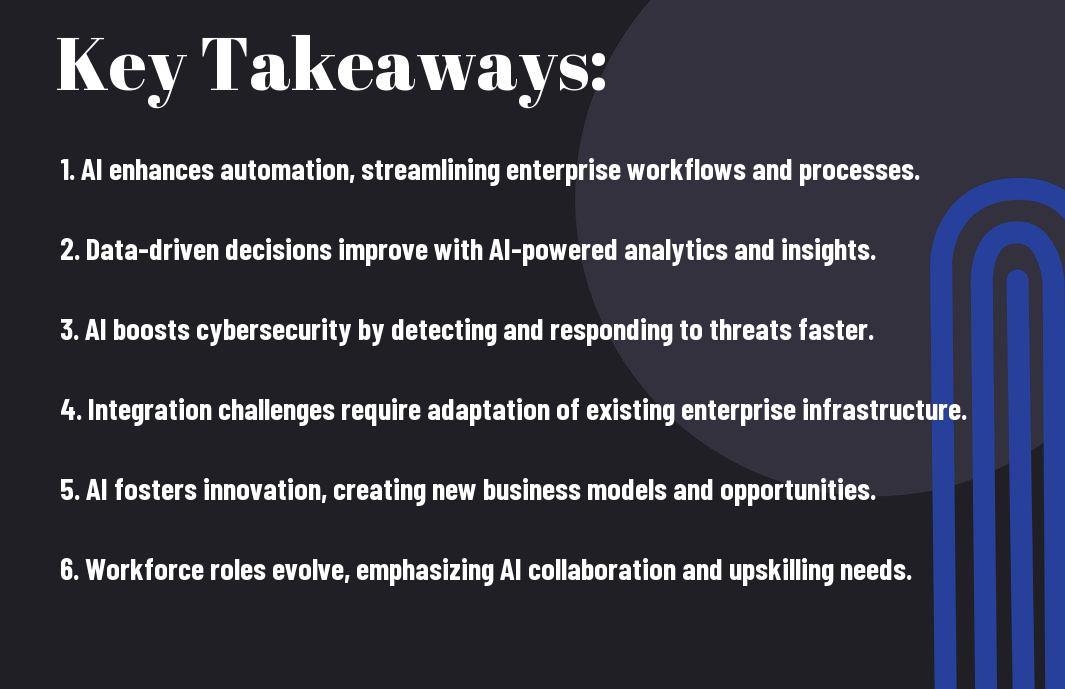Enterprise technology is rapidly evolving, and understanding the impact of AI on your operations is important for staying competitive. As AI continues to integrate into various aspects of business, it offers increased efficiency and cost savings, while potentially introducing risks related to data security and job displacement. By recognizing how AI can transform your enterprise, you can harness its benefits and address the challenges, ensuring your organization thrives in this technological landscape.
Transforming Business Processes with Intelligent Automation
Intelligent automation revolutionizes the way businesses operate by merging advanced technologies like artificial intelligence, machine learning, and robotic process automation. This synthesis not only reduces manual workload but also enhances precision across operations. By automating repetitive tasks, you free up your workforce to focus on strategic initiatives, driving greater value and efficiency throughout your organization. In this dynamic landscape, organizations leveraging intelligent automation realize significant improvements in productivity and service delivery, setting the stage for a more agile responsiveness to market changes.
Streamlining Operations through AI-Driven Solutions
Implementing AI-driven solutions enables you to streamline operations by enhancing efficiency and reducing errors in various workflows. From automating customer service inquiries using chatbots to optimizing supply chain logistics through predictive modeling, AI empowers your operations to function seamlessly. The result is a faster-paced environment where resources are allocated more effectively, allowing you to respond promptly to customer demands and shifting market conditions.
Enhancing Decision-Making with Predictive Analytics
With predictive analytics, you gain the capability to make data-driven decisions that significantly impact your business outcomes. By leveraging historical data and identifying patterns, predictive models deliver insights that help you anticipate market trends and customer behavior. This foresight not only aids in optimizing resource allocation but also minimizes risks associated with decision-making processes.
In practice, organizations utilizing predictive analytics can see a marked difference in operational efficiency and profitability. For instance, retail companies can forecast demand for products with greater accuracy, allowing for optimized inventory management, which can lead to a reduction in excess stock by over 30%. Additionally, financial institutions apply predictive models to assess credit risks more effectively, reducing default rates by as much as 25%. By embracing predictive analytics, you position your enterprise to proactively adapt strategies, stay ahead of competitors, and foster enhanced customer satisfaction through tailored experiences.


The Role of AI in Data Management and Analysis
AI significantly enhances data management and analysis by enabling faster processing and deeper insights from vast datasets. Through advanced algorithms, AI can identify patterns and trends that would otherwise remain hidden to human analysts, thereby driving decision-making processes across various enterprise functions. Seamless integration of AI into your systems not only improves efficiency but also provides competitive advantages in understanding customer behavior and market dynamics. For further insights on AI’s transformative potential, refer to The Impact of AI on Enterprise Networks: A Blueprint for ….
Leveraging Big Data through Machine Learning Techniques
Machine learning techniques enable organizations to leverage big data effectively, by identifying valuable insights and predicting outcomes based on previous patterns. These algorithms can analyze customer interactions and operational metrics at scale, allowing you to tailor strategies that enhance user experience and optimize resources, leading to improved performance exponentially. Case studies reveal that companies implementing these techniques report a significant increase in customer engagement and operational efficiency.
Ensuring Data Privacy and Security in an AI-Driven Ecosystem
In an AI-driven ecosystem, safeguarding data privacy and security becomes a top priority for enterprises. With the increasing risk of breaches and misuse, implementing robust encryption, access controls, and compliance protocols ensures that sensitive information remains protected. Adopting a proactive approach to data governance, including regular audits and risk assessments, not only safeguards your assets but also builds trust with customers.
Addressing data privacy and security requires a multi-faceted strategy in your organization. Implementing GDPR and CCPA compliance measures enhances your adherence to regulations while increasing user confidence in your data handling practices. Training employees on data security protocols and fostering a culture of vigilance can mitigate risks and enhance your resilience against emerging cyber threats. By integrating these practices into your AI initiatives, you empower your enterprise to innovate securely without compromising user trust.
Revolutionizing Customer Engagement with AI Technologies
AI technologies are transforming how businesses engage with their customers, providing more personalized and efficient interactions. By leveraging data analytics and machine learning, companies can create experiences that resonate with individual preferences and needs. Tools such as chatbots and predictive analytics not only streamline processes but also enhance customer satisfaction and loyalty. For a deeper understanding of this transformative approach, you can explore What Is Enterprise AI?.
Personalization through Chatbots and Virtual Assistants
Chatbots and virtual assistants are at the forefront of AI-driven personalization, offering immediate responses tailored to your specific inquiries. These intelligent systems analyze user data to provide relevant recommendations, ensuring that the answers you receive are not only timely but also aligned with your history and preferences. Enhancing your customer experience, they operate 24/7 and can handle multiple queries simultaneously, all while learning from each interaction to improve future responses.
AI-Powered Insights for Improved Customer Relationships
Utilizing AI for customer insights allows businesses to uncover valuable trends and preferences that enhance customer relationships. By analyzing customer behavior across various touchpoints, AI tools can identify patterns that lead to more targeted marketing and better service delivery. This analytical capability results in increased customer retention and a deeper understanding of your audience’s needs.
AI continuously sifts through vast amounts of data, offering insights that can lead to more effective communication strategies and product offerings. For instance, brands can utilize predictive modeling to determine when a customer is likely to make future purchases or what products may interest them based on past behavior. This level of insight translates into proactive engagement strategies—whether through personalized email campaigns or tailored offers—that foster stronger, lasting connections between you and your customers. By implementing such AI solutions, you’re not just reacting to customer needs but anticipating them, thereby cultivating loyalty and enhancing overall satisfaction.
Navigating the Ethical Landscape of AI Adoption
AI adoption presents not only technological advancements but also ethical challenges that must be navigated carefully. As enterprises implement AI solutions, they face decisions that define their ethical stance, influencing public perception and employee trust. Balancing innovation with responsibility requires a framework for ethical considerations, ensuring transparency in AI usage while adhering to regulatory guidelines.
Addressing Bias and Fairness in AI Algorithms
The presence of bias in AI algorithms can lead to unfair outcomes, affecting decisions in hiring, lending, and law enforcement. An awareness of potential biases in the training data is necessary; for instance, if historical data reflects discriminatory practices, AI may perpetuate these issues. You must implement diverse datasets and continuous audits to enhance fairness in your AI systems.
The Implications of AI on Employment and Workforce Dynamics
The integration of AI technologies is reshaping workforce dynamics significantly. While automation of routine tasks can enhance efficiency, a report from McKinsey estimates that by 2030, as many as 375 million workers could need to change occupational categories due to AI’s disruptive effects. This transformation demands a comprehensive reevaluation of skill sets, leading to upskilling and reskilling initiatives.
AI’s impact on employment transcends job displacement. While some roles may diminish, new positions focused on AI management, oversight, and development will emerge. The demand for skilled workers capable of collaborating with AI systems will surge, prompting businesses to invest in training programs. Companies like Amazon and Google are already initiating extensive training courses to prepare employees for this shift, highlighting the urgency for workforce adaptation in the AI-driven job market.
Future-Proofing Enterprises: AI as a Strategic Asset
AI isn’t just a technological upgrade; it represents a significant shift in how you can approach business strategy. By leveraging AI effectively, organizations can stay ahead of market trends, improve operational efficiency, and enhance customer experiences. The landscape of enterprise software is evolving rapidly, and understanding the future of AI in enterprise software will be integral to remaining competitive.
Incorporating AI into Long-Term Business Strategies
Embedding AI into your long-term business strategies allows you to harness its potential across various departments. Identify areas where AI can optimize processes, reduce costs, and enhance service delivery. Successful companies allocate resources to AI initiatives and continuously assess their impact on performance metrics, ensuring alignment with overarching goals.
Building a Culture of Innovation and Adaptability
Fostering a culture of innovation and adaptability empowers your teams to embrace new technologies. By promoting a mindset that values experimentation and continuous learning, you position your enterprise to quickly respond to changes in the market and technology landscape. This proactive approach not only drives employee engagement but also accelerates the adoption of AI solutions.
A culture that prioritizes innovation requires consistent support from leadership and a willingness to invest in employee development. Encouraging cross-functional collaboration can channel diverse perspectives into innovative solutions. For instance, offering AI training workshops helps demystify technology, while hackathons can stimulate creative thinking. By nurturing this environment, you cultivate a workforce ready to leverage AI as a strategic asset, ultimately leading to sustained growth and competitive advantage.
To wrap up
Ultimately, understanding the impact of AI on enterprise technology is crucial for you to stay competitive in today’s rapidly evolving landscape. As AI continues to enhance operational efficiency, decision-making, and customer engagement, you need to adapt your strategies to leverage these advancements effectively. By embracing AI tools and techniques, you can optimize your processes, drive innovation, and create a more agile organization. Staying informed about these changes will empower you to make better decisions and capitalize on new opportunities in your enterprise journey.











